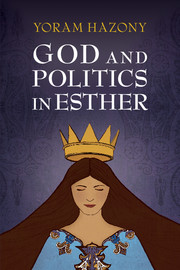Book contents
- Frontmatter
- Dedication
- Contents
- Preface
- Introduction
- Esther One
- Esther Two
- Esther Three
- 3 The Enemy
- 4 The King's Men
- 5 Idolatry
- 6 Disobedience
- 7 Joseph
- 8 Amalek
- 9 Anti-Semitism
- Esther Four
- Esther Five
- Esther Six
- Esther Seven
- Esther Eight
- Esther Nine
- Afterwords
- Notes
- Index of Names
- Scriptural and Rabbinic References
- The Hebrew Esther Text
- Miscellaneous Endmatter
8 - Amalek
from Esther Three
Published online by Cambridge University Press: 05 March 2016
- Frontmatter
- Dedication
- Contents
- Preface
- Introduction
- Esther One
- Esther Two
- Esther Three
- 3 The Enemy
- 4 The King's Men
- 5 Idolatry
- 6 Disobedience
- 7 Joseph
- 8 Amalek
- 9 Anti-Semitism
- Esther Four
- Esther Five
- Esther Six
- Esther Seven
- Esther Eight
- Esther Nine
- Afterwords
- Notes
- Index of Names
- Scriptural and Rabbinic References
- The Hebrew Esther Text
- Miscellaneous Endmatter
Summary
Beyond the insinuation of idolatry, the narrative sends a second, unmistakable signal that the introduction of Haman into the story is a red-flag event, a point of no return beyond which there is no choice but to drop every pretense of political accommodation and fight. For Haman, we are told, is an Agagite. Writers have argued over whether Haman is supposed to be a literal descendent of Agag, king of the Amalekites, who had led them against the Jews in the first years of the Israelite kingdom five centuries earlier, or whether the reference is intended to be figurative. But in either case, the association is clear and the narrative stresses it in various ways so that it cannot be dismissed. Mordechai himself is introduced as being a Benjaminite, a great-grandson of Kish, and therefore a relation of Saul, son of Kish, who became the first king of the Jews and united them in the war against Agag. Moreover, the war against the Amalekites itself goes back even further, dating from the first days of the Jews in the desert, when Amalek harassed the liberated slaves without mercy. The result is that Haman is not merely “the enemy of the Jews” because of his determination to murder them, nor is he simply an anti-Semite, although this is also the case. Haman the Agagite is heir to a conflict that has been with the Jews from the day they left Egypt and became a people.
The exodus of the Jews from Egypt is the central figure around which all of later biblical and Jewish history is built: To do God's will, Israel must leave “the house of bondage,” where they have been enslaved to the will of arbitrary men, and strike out into the wilderness of Sinai in search of a truth and a law that derives from something higher than this. Only once they have attained such a truth and such a law is it possible to proceed, armed now with both freedom and knowledge, to the land of the promised redemption.
This message is one of eternal hope for the Jews and for all mankind, and yet it is hardly one of optimism. Having left Egypt amid signs and wonders, the Jews find themselves very far from utopia.
- Type
- Chapter
- Information
- God and Politics in Esther , pp. 62 - 69Publisher: Cambridge University PressPrint publication year: 2015



